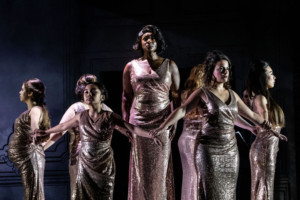Review: MANON LESCAUT, Opera Holland Park

![]() It is never a good sign when, just as the hush descends on an expectant house, a civilian appears on stage, mic in hand. We were informed that Elizabeth Llewellyn had only recently recovered from laryngitis which, rightly, elicits sympathy, but it does nag away a little as the show unfolds. Rather like driving without a top gear, you do get there, but it feels more laboured than it ought to be. Maybe that piece of news should have been withheld for the curtain call.
It is never a good sign when, just as the hush descends on an expectant house, a civilian appears on stage, mic in hand. We were informed that Elizabeth Llewellyn had only recently recovered from laryngitis which, rightly, elicits sympathy, but it does nag away a little as the show unfolds. Rather like driving without a top gear, you do get there, but it feels more laboured than it ought to be. Maybe that piece of news should have been withheld for the curtain call.
The shallow, but very wide stage, doesn't help matters either, director Karolina Sofulak appearing to be reluctant to bring the would-be lovers together for fear of isolating them in the expanse. As love affairs go, it's all a little antiseptic.
We get that Manon and Peter Auty's Des Grieux are doomed never to live happily ever after (it's Puccini after all) but the tragedy of their fate is mitigated somewhat by the hesitancy they show towards each other whenever an opportunity for any intimacy presents itself. Auty may be singing that life itself means nothing without Manon, but he gives the impression that he has half a mind on checking those Ebay bids he has running. The passion is there in the voice, if not in the deeds.
Designer, George Johnson-Leigh, goes for a Georgy Girl mid-Sixties vibe, which doesn't entirely convince, though the whiff of Stephen Ward that lingers whenever Stephen Richardson's Geronte swaggers on to the stage, adds to his loathsome character.
The setting does lower the stakes for Manon though - one's left wondering why she doesn't just pick things up again at a time and in a place that judged "fallen women" less pejoratively than at any time in history. The ending has the air of a set up for a sequel - surely not Puccini's intention.
Paul Carey Jones's Lescaut, who both reads his sister's psychology and ruthlessly exploits it to gain an entrée into this glamorous, scandalous, lubricious demi-monde, may be even more despicable than Geronte, but decency is trumped by cynicism everywhere in Manon's world, so he's hardly out of step.
If there's a bit of jarring in the staging, there's none in the music and singing. Llewellyn, once she hits the home straight and knows that her voice will go the distance, gives full rein to her powerful soprano that never loses the crucial fragility it requires to illustrate Manon's disastrous decision making.
Auty is good throughout in his vocal work, nicely balanced with the orchestra, which proves a little loud at times, especially with so much of the singing done from the extreme ends of this wide stage. I'd have liked to hear more of Ellie Edmonds' nightclub singer too, but she soon finds favour with the fickle Geronte who, no doubt, has other uses for her tongue.
For all the specific issues noted above and the stiffness so caused, the evening is saved, indeed soars, as a result of two aspects of the show.
Under Peter Robinson's baton, the City of London Sinfonia play Puccini's wonderful music with real élan, especially in Acts Three and Four as the stakes are raised and passions rise. It really is worth the price of the ticket to hear that music played with such sympathy and power, up close and personal.
They're at their best in an electrifying scene in which Geronte's harem of women (and girls) are paraded for his leering punters, all in matching gold lamé dresses, all with the dead eyed look of contempt on their faces, all mere commodities in a world made by, and for, rich men. It's the only time we really grasp the perilous nature of Manon's life, the loss she suffered in her fatal indecision over Des Grieux's inability to furnish her with the baubles she so admired and the fate that awaits her. It's a scene that will live long in the memory.
Manon Lescaut continues at the Opera Holland Park until 26 June.
Photo Ali Wright
Reader Reviews

Videos
